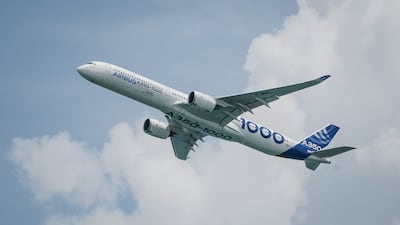Airbus plans to deliver 800 commercial planes to its airline customers this year, as the world's biggest plane maker steps up production of its top-selling A320 family of narrow-body aircraft, while its US rival Boeing is grappling with its latest crisis after a near-disaster incident last month.
That delivery target is nearly 9 per cent higher than the 735 commercial planes Airbus handed over last year, the company said on Thursday as it reported fourth-quarter and full-year financial earnings.
Airbus's 2024 guidance assumes no further disruption to the global economy, air traffic, the supply chain, the company’s internal operations and its ability to deliver products, it said.
"The guidance reflects our expected growth trajectory and the investments we're making to prepare for the future," Airbus chief executive Guillaume Faury said.
"We are working closely with our global supply chain partners as we ramp up across all programmes at the same time, with safety and quality at the heart of all we do."
Mr Faury confirmed the planned manufacturing increase of A320 Neos to a rate of 75 a month by 2026 was "on track".
Airbus's target of 800 handovers this year would mean the plane maker continuing to pull ahead of its main competitor Boeing.
The US Federal Aviation Administration has barred Boeing from increasing the existing 737 Max production rate, pending improvements in quality control, after a door panel blew off an Alaska Airlines' 737 Max 9 jet mid-flight last month.
This caps Boeing's delivery plans for the narrow-body model and puts it at a disadvantage to Airbus, who continues to overtake Boeing in the single-aisle jet market. The Airbus A320 Neo competes directly with the 737 Max.
Mr Faury this week said the Boeing incident "made us very humble" and was a lesson for the entire industry to reflect on safety, even as there are fewer accidents in global commercial aviation.
Toulouse, France-based Airbus is facing its own set of challenges from supply chain bottlenecks to a problem with engines built by Pratt & Whitney that has led to hundreds of A320 Neo jets being grounded for inspection.
Safety culture
Asked how Airbus plans to increase the production rate of its A320 family jets without compromising quality, Mr Faury said: "It cannot be quantity over quality. We don’t [just] want to deliver a number of planes, we want to deliver a number of planes that are of high quality and safe. That's something we make very clear to our teams."
The only way to do this is "to constantly believe you're not doing it, to constantly challenge yourself, to be afraid of what could go wrong".
Mr Faury added: "We cannot deliver quantity at the detriment of quality, because what we deliver first is quality and safety.
"The product we deliver is a safe transportation mode. If we fail on this, we have to go back to the drawing board because that is the very basics of what we do."
Supply chain woes
The global aviation industry continues to grapple with supply chain problems, from a shortage of parts to fewer skilled workers, since the Covid-19 pandemic hamstrung the industry's operations.
Airbus is trying to strike a "good balance" between supply constraints and the strong air travel demand in order to increase production and meet its jet delivery goals, Mr Faury said.
"We have this permanent tension between what the supply chain is able to deliver and what we need, so we are pacing the ramp-up and looking at all these bottlenecks ... and that's a permanent balance between demand and supply that we're trying to strike," he said.
"Overall, it remains a very critical area of attention for us."
Airbus hired 13,000 people last year and plans to add "roughly half" that number this year, Mr Faury said.
Special dividend
Airbus on Thursday said it will pay a special dividend of €1 per share, besides a €1.8 regular dividend, as its net cash reached €10.7 billion ($11.5 billion).
The company posted a 13 per cent decline in fourth-quarter profit, despite revenue increase.
Its net profit in the three months to the end of December dropped to €1.45 billion from €1.67 billion in the fourth quarter of 2022, the company said. Quarterly revenue rose 11 per cent year-on-year to €22.8 billion.
Full-year net profit fell 11 per cent year-on-year to €3.8 billion last year, weighed down by charges related to its space business.


